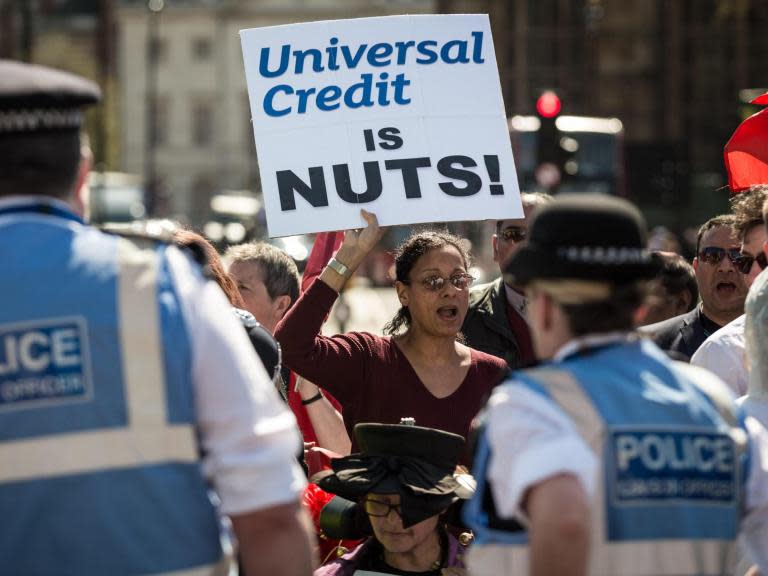Universal credit could be the greatest administrative blunder by a British government yet
The important thing to understand about the fiasco over universal credit – whose full rollout looks set to be delayed for the umpteenth time by ministers amid rising alarm from senior Conservatives about its impact on benefit recipients – is that it was not just predictable but predicted.
This failure did not come out of the blue. As far back as 2013 the National Audit Office was warning that the Department for Work and Pensions had grossly unrealistic expectations of how rapidly Iain Duncan Smith’s plan to roll up six different benefits into a single payment could be accomplished.
“The department was not able to explain to us how it originally decided on October 2013 or evaluated the feasibility of rollout by this date. The ambitious timetable created pressure on the department to act quickly,” said the independent spending watchdog.
The NAO blew the whistle on incompetence too, warning that “throughout the programme the DWP has lacked a detailed view of how universal credit is meant to work”.
The House of Commons’ Public Accounts Committee that same year also reported that management of the programme had been “extraordinarily poor” and that there had been “a failure to monitor and challenge progress regularly, and a failure to intervene promptly when problems arose”.
It’s said that a week is a long time in politics; that everything can change remarkably quickly. But often the opposite is true: sometimes nothing changes in five years.
Those crystalline 2013 warnings were ignored by ministers. The universal credit caravan, pulled by a failing department, was allowed to continue trundling towards the cliff edge, albeit at a slower pace.
This is not about austerity – or at least the issue of benefits cuts is tangential. As Torsten Bell of the Resolution Foundation has pointed out, universal credit cannot be responsible for increases in poverty in recent years, quite simply, because it has not been extensively rolled out yet.
The responsibility there lies with the cuts in the existing benefits system pushed through by former chancellor George Osborne – and retained, so far at least, by his successor Philip Hammond.
And, as Paul Johnson of the Institute for Fiscal Studies has stressed, the apparent surge in concern that the new system will make some people worse off relative to the existing system is somewhat bizarre as this was always the explicit intention.
Universal credit was always designed to take money from some while giving more to others in the belief that this would sharpen work incentives.
It’s an indictment that so many Conservatives, not least the current work and pension secretary Esther McVey, supported the scheme without, apparently, being aware of this. Was John Major, who now warns vividly about the possibility of a poll-tax-style insurrection over universal credit, not paying attention for eight years? The time to sound this alarm was when the scheme was first proposed.
The IFS estimates that the government will need to spend at least an extra £19bn a year by 2023 to give credibility to Theresa May’s pledge to “end austerity”. But that’s just the funding required by public services to avoid further cuts. To end austerity for welfare recipients would require an additional £7bn of spending. Yet even if this money is found it will not solve the issues of practical disruption over the transition of millions of existing claimants to universal credit.
The central problem here is implementation and administrative incompetence. It’s the failure and refusal of ministers to respond to warnings and expert feedback.
In The Blunders of our Governments, published in 2013, Anthony King and Ivor Crewe look at case studies of debacles over recent years from the Conservatives’ poll tax, to Labour’s fraud-ridden “Individual Learning Accounts” and the abandoned £11bn NHS supercomputer.
“We believe there have been far too many of them and that most, perhaps all, of them could have been avoided,” King and Crewe wrote.
They identified common features in these blunders. “Decisive” ministers tend to ignore well-informed critics, who they dismiss as partisans or defenders of vested interests. There is no proper deliberation on policy, too few checks on process. There is excessive turnover of officials and ministers with oversight and responsibility for major projects. There is a fatal lack of accountability.
Iain Duncan Smith’s brainchild was too recent to feature in King and Crewe’s book. The legislation launching universal credit was only passed in 2012. But a new edition would surely install universal credit as the inglorious centrepiece of UK governmental blunders.

 Yahoo News
Yahoo News 

